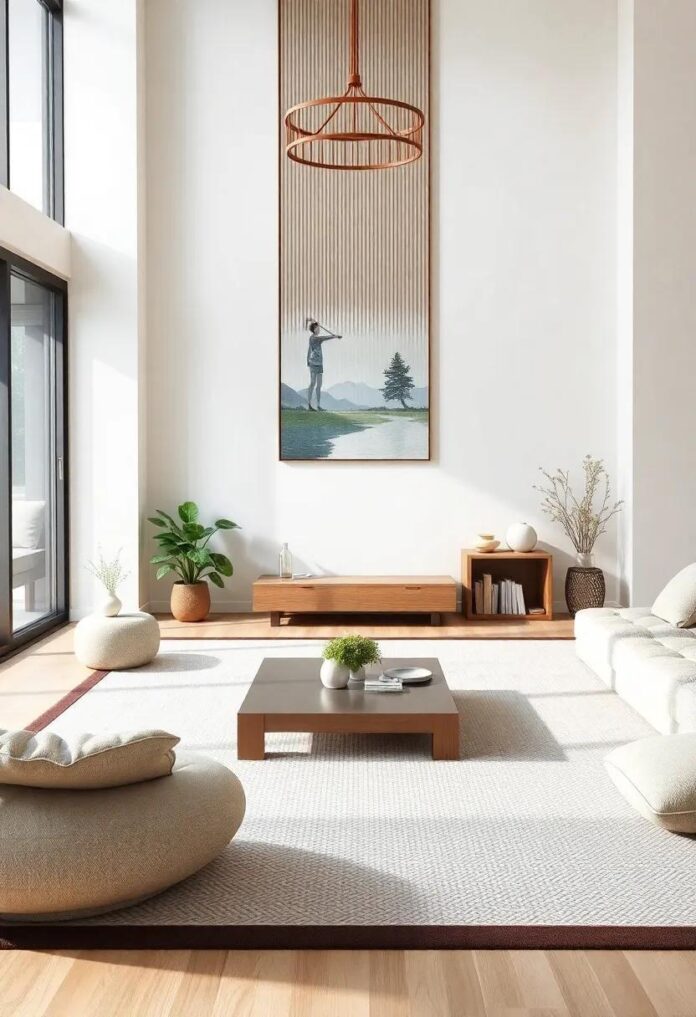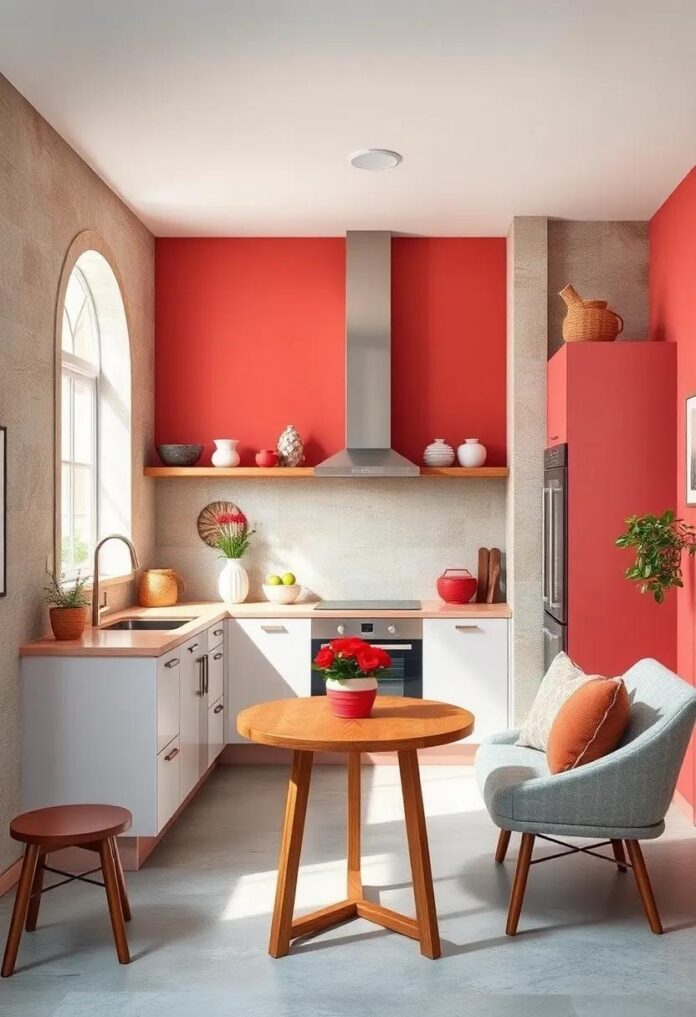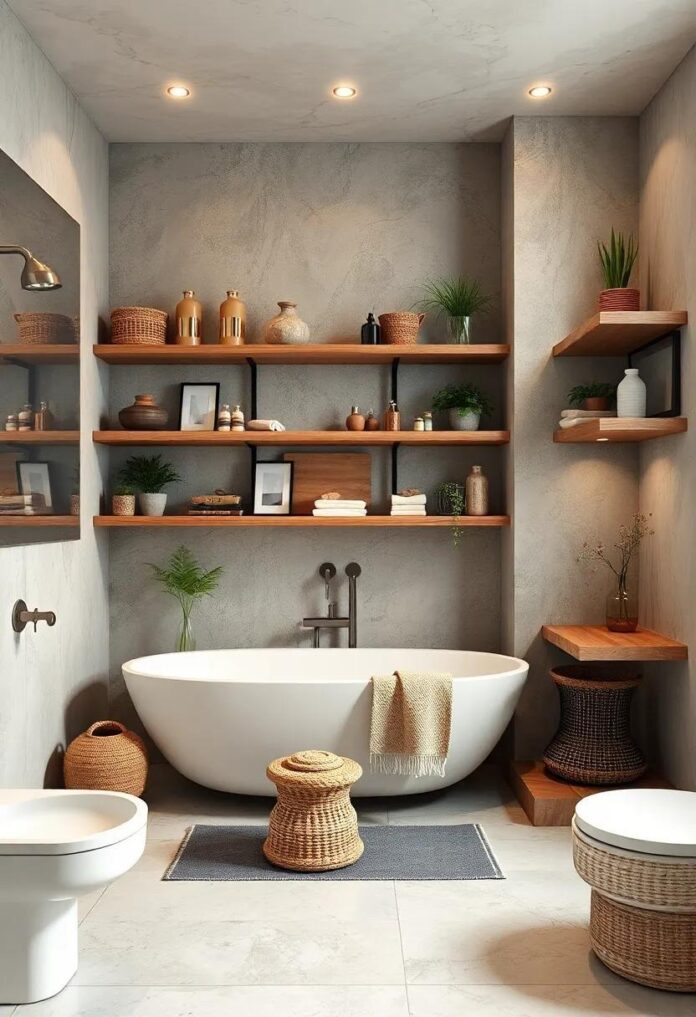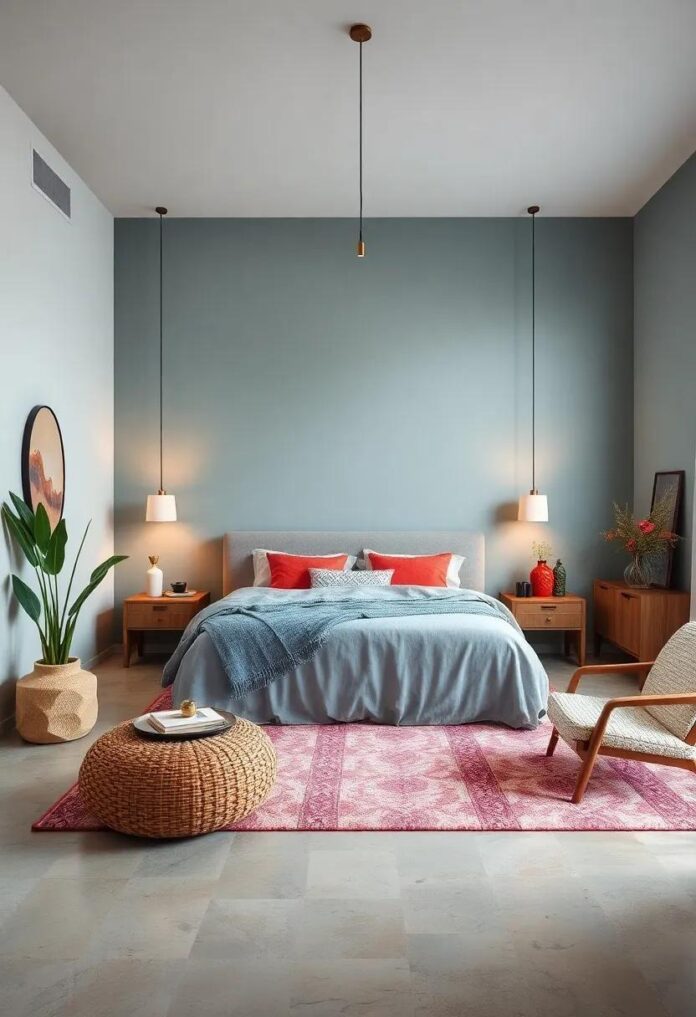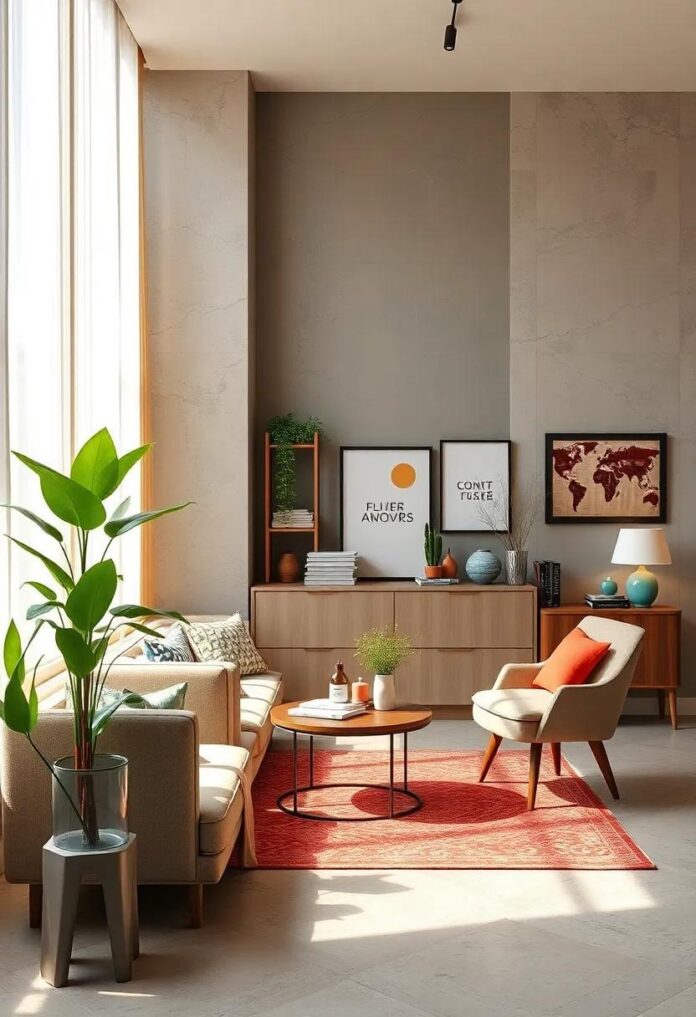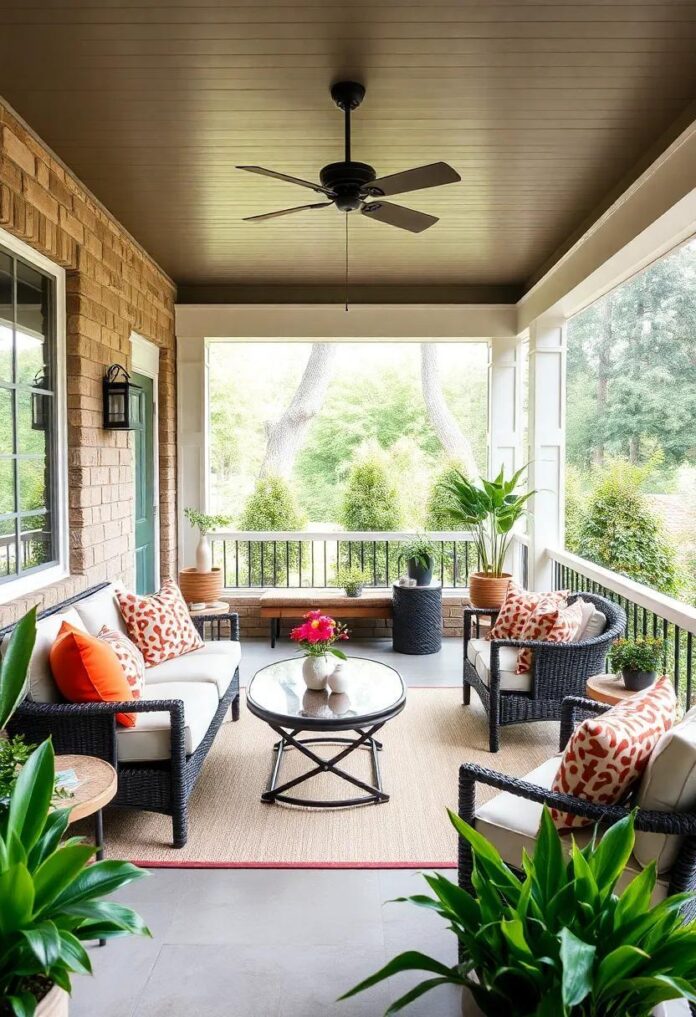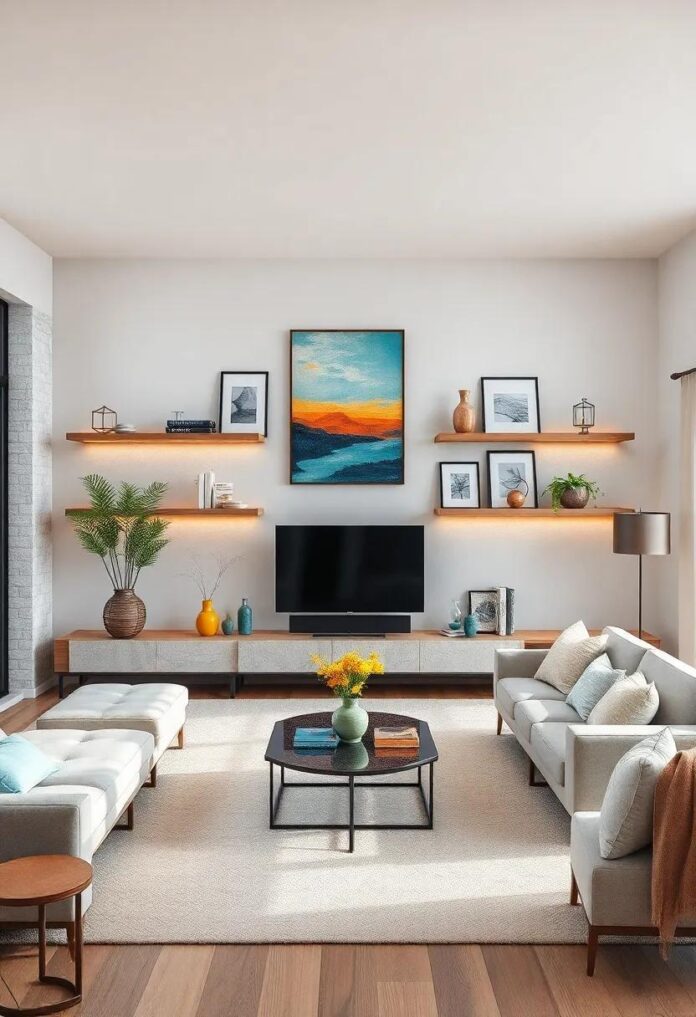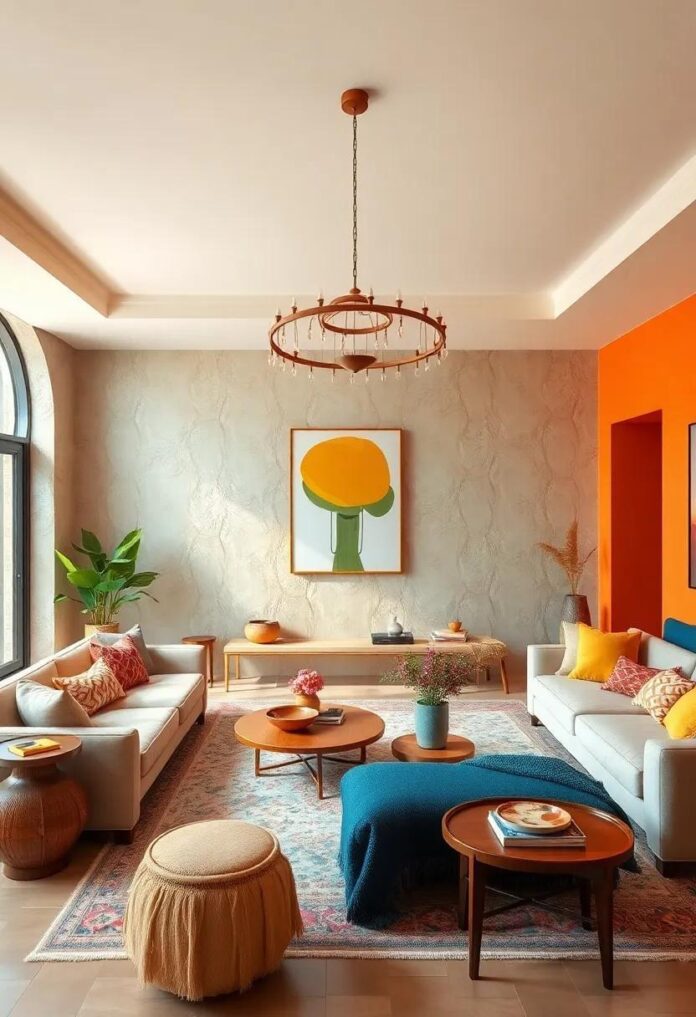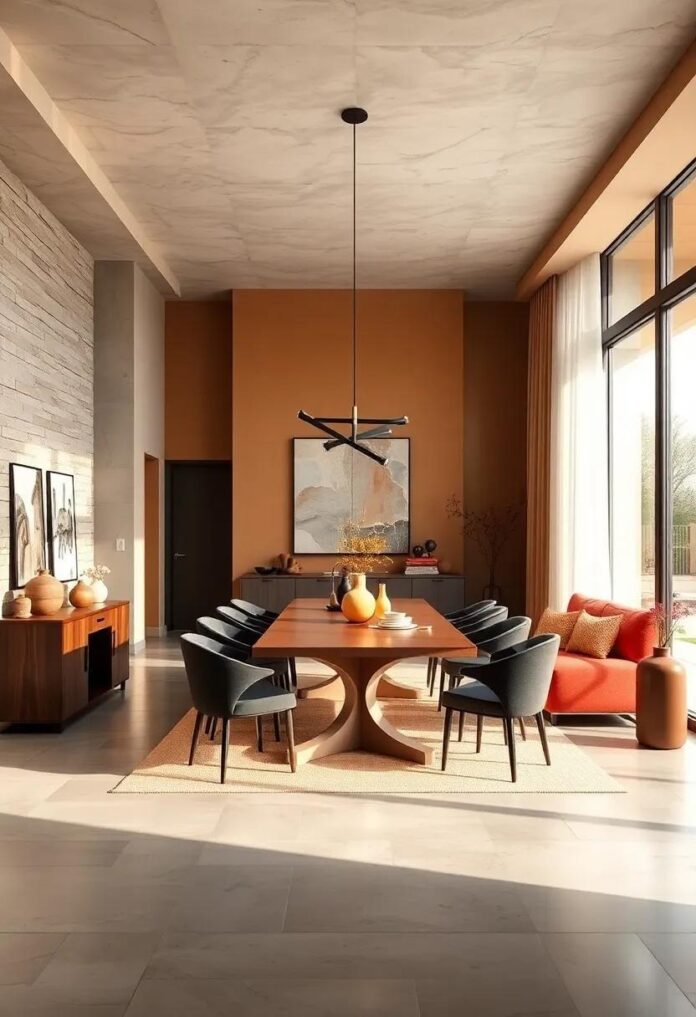In our fast-paced world, were the cacophony of daily life often drowns out the whispers of tranquility, the allure of serene spaces has never been more appealing.One such sanctuary that epitomizes peace adn harmony is the customary Japanese living room. Rooted in centuries of culture, art, and ideology, Japanese decor invites us to slow down, breathe deeply, and appreciate simplicity. “” invites you to delve into the essence of this understated aesthetic. From the delicate balance of nature and design to the mindful use of materials and colors,this article will explore how to transform yoru living space into a haven of calm. Whether you’re seeking a full overhaul or small, thoughtful adjustments, discover how these principles can create an oasis of relaxation in your home.join us on this journey to embrace serenity and find inspiration in the quiet beauty of Japanese interiors.
Embracing Minimalism in Japanese Living Room Aesthetics
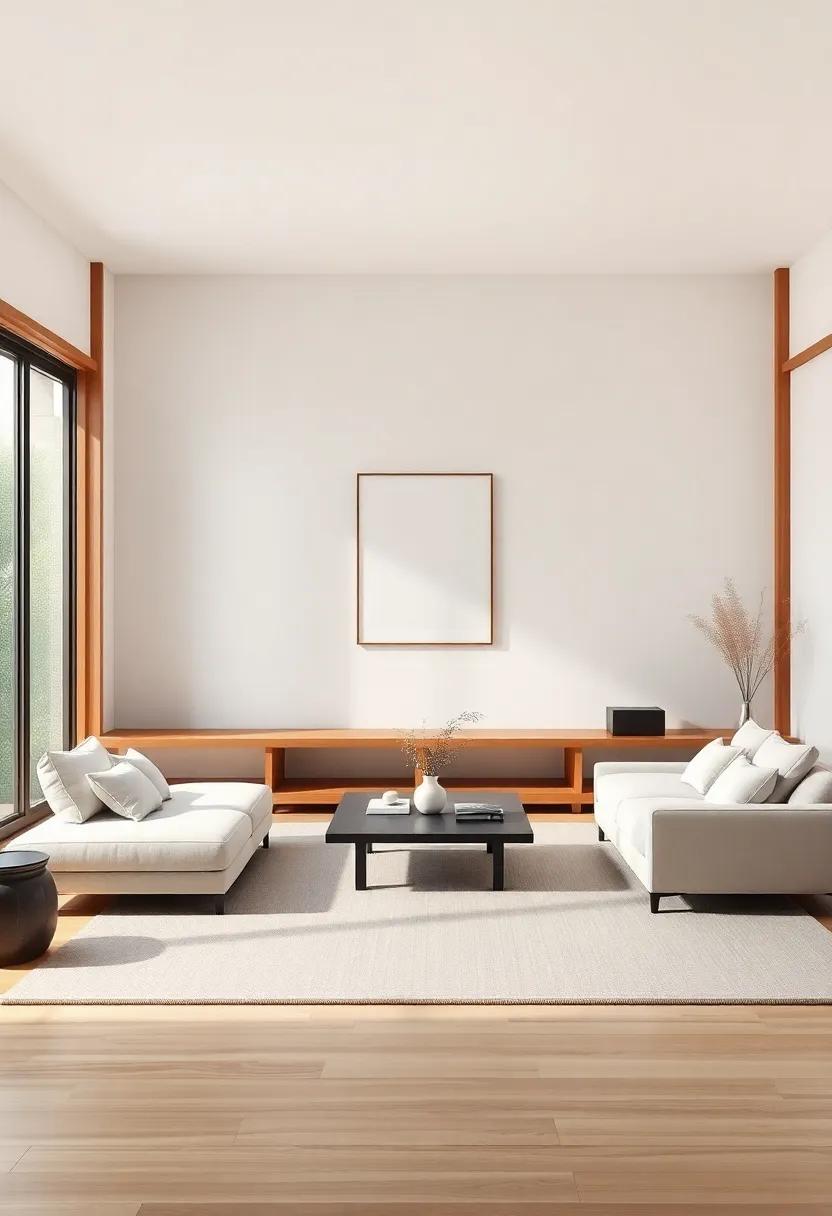
The essence of minimalism in Japanese living room design lies in its ability to create a space that feels open, serene, and harmonious. To achieve this aesthetic, consider incorporating natural materials such as wood and stone that resonate with the simplicity of nature. furnishings should be low-profile and unobtrusive, emphasizing an unobstructed flow of energy throughout the room. key elements may include:
- Low furniture: Think of tatami mats and low tables that promote a relaxed seating arrangement.
- Neutral colors: Soft earth tones and subtle shades create a calming backdrop.
- Open spaces: Avoid clutter by allowing for ample space between objects, encouraging tranquility.
Incorporating meaningful decor further enhances the minimalist approach, focusing on the idea of ’less is more.’ Select a few carefully curated pieces such as traditional Japanese calligraphy,a striking vase,or a simple bonsai that bring a sense of purpose to the space without overwhelming it. Additionally, consider the beauty of natural light, wich can be maximized through large windows or shoji screens, casting soft shadows and creating a serene atmosphere. A table summarizing essential design elements may look like this:
| Design Element | Purpose |
|---|---|
| Natural Materials | Promote harmony with nature |
| Neutral Colors | Create a calming backdrop |
| Low-Furniture | Encourage relaxation and comfort |
| Open Spaces | Enhance tranquility |
The Power of Natural Light in Creating a Serene Atmosphere
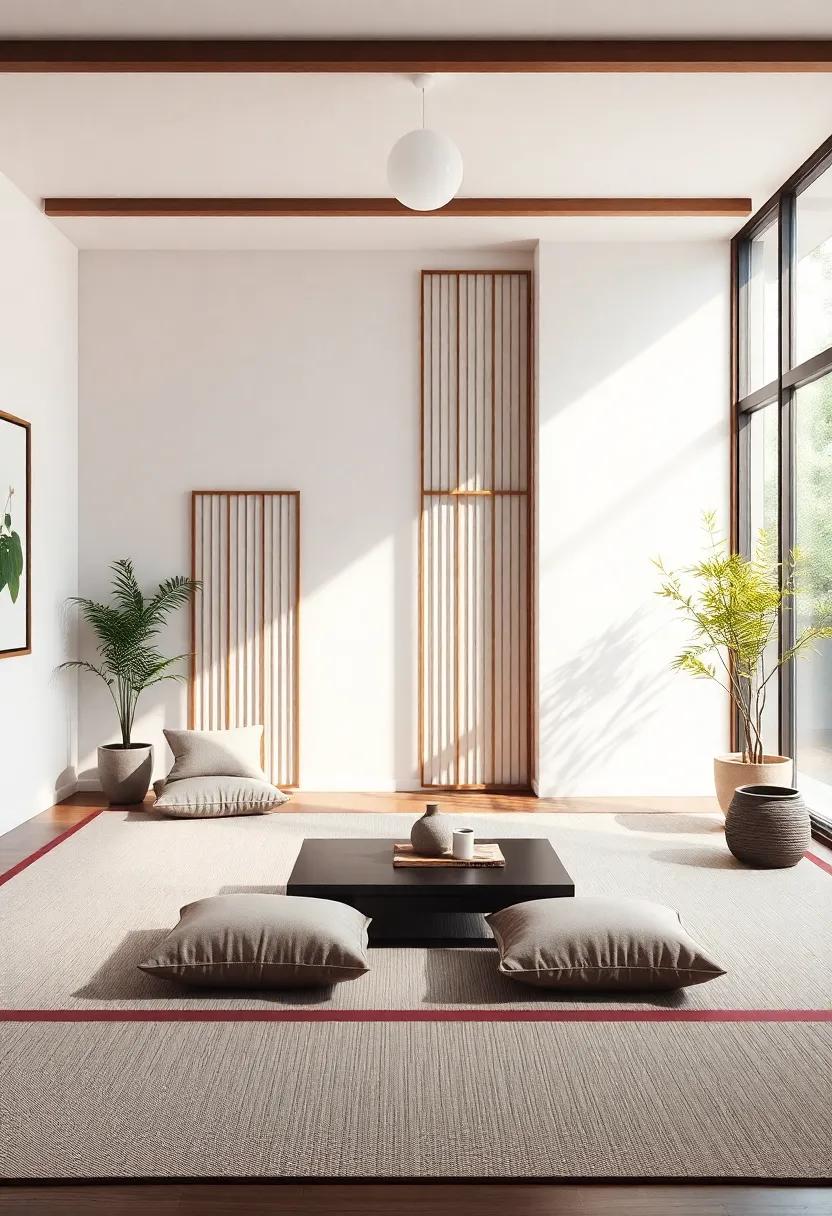
Natural light plays a pivotal role in crafting an atmosphere that embodies tranquility and calm. The gentle illumination of a sunlit space can significantly affect our mood and well-being. In a japanese living room, maximizing exposure to sunlight enhances the minimalistic design, allowing the soft glow to interplay with elements of nature. Large shoji screens, strategically placed, offer a seamless transition between indoor and outdoor spaces, inviting the beauty of nature inside. This fusion promotes a sense of harmony and serenity that is quintessential to Japanese aesthetics.
Incorporating soft, earthy tones in your decor will further amplify the effects of natural light. Opt for materials such as wood and stone that absorb and reflect the light, creating a warm and inviting ambiance. Consider these elements to enhance the atmosphere:
- Sheer Curtains: allow light to filter softly into the room.
- Reflective Surfaces: Incorporate glass or polished wood to bounce light around.
- Natural Elements: Use plants that thrive in light-rich environments to bring life and serenity indoors.
- Open Space: Maintain a clutter-free area to let light flow unobstructed.
Incorporating Traditional Tatami Mats for Authentic Charm
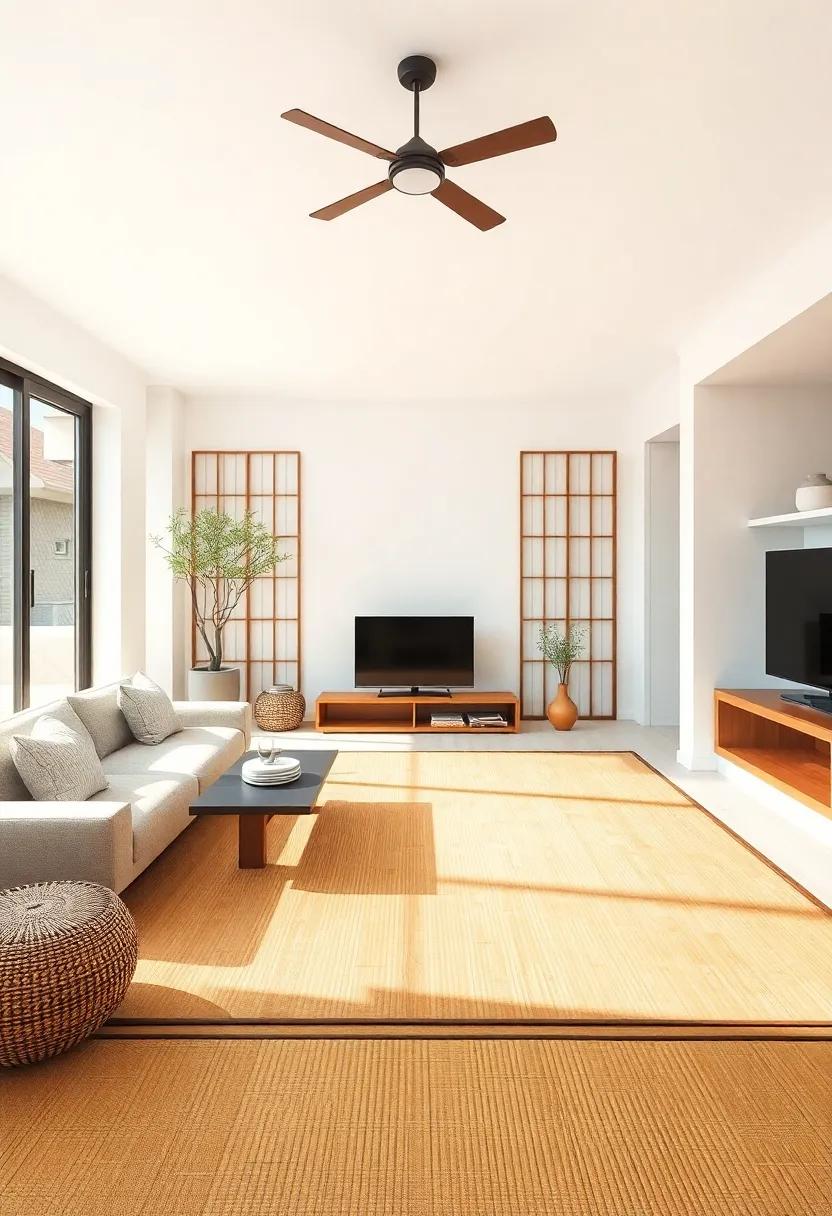
Integrating traditional tatami mats into your living space offers not just aesthetic appeal but also enhances the overall ambiance of tranquility and harmony. These woven rush grass mats are more than a flooring choice; they embody the essence of Japanese design, inviting a sense of earthiness and comfort. For an authentic look, consider layering your tatami with soft cushions, understated furniture, and organic decor. This creates a welcoming atmosphere that encourages relaxation and mindfulness.
To achieve a balanced decor with tatami, pay attention to key elements that complement their natural textures and colors. Consider incorporating:
- natural Light: Maximize windows to allow sunlight to illuminate the texture of the tatami.
- Minimalist Furniture: Choose low-profile furniture that aligns with the tatami’s level and simplicity.
- Earthy colors: Use a palette of greens, browns, and neutrals that harmonize with the natural fibers.
This harmonious approach not only defines the space but also reflects the philosophy of simplicity inherent in traditional Japanese styling. Whether you’re using tatami as the primary flooring or in a designated area for sitting and meditation, the tactile experience they provide can significantly influence your daily life and relaxation practices.
Choosing the Right Color Palette for Calmness and Balance
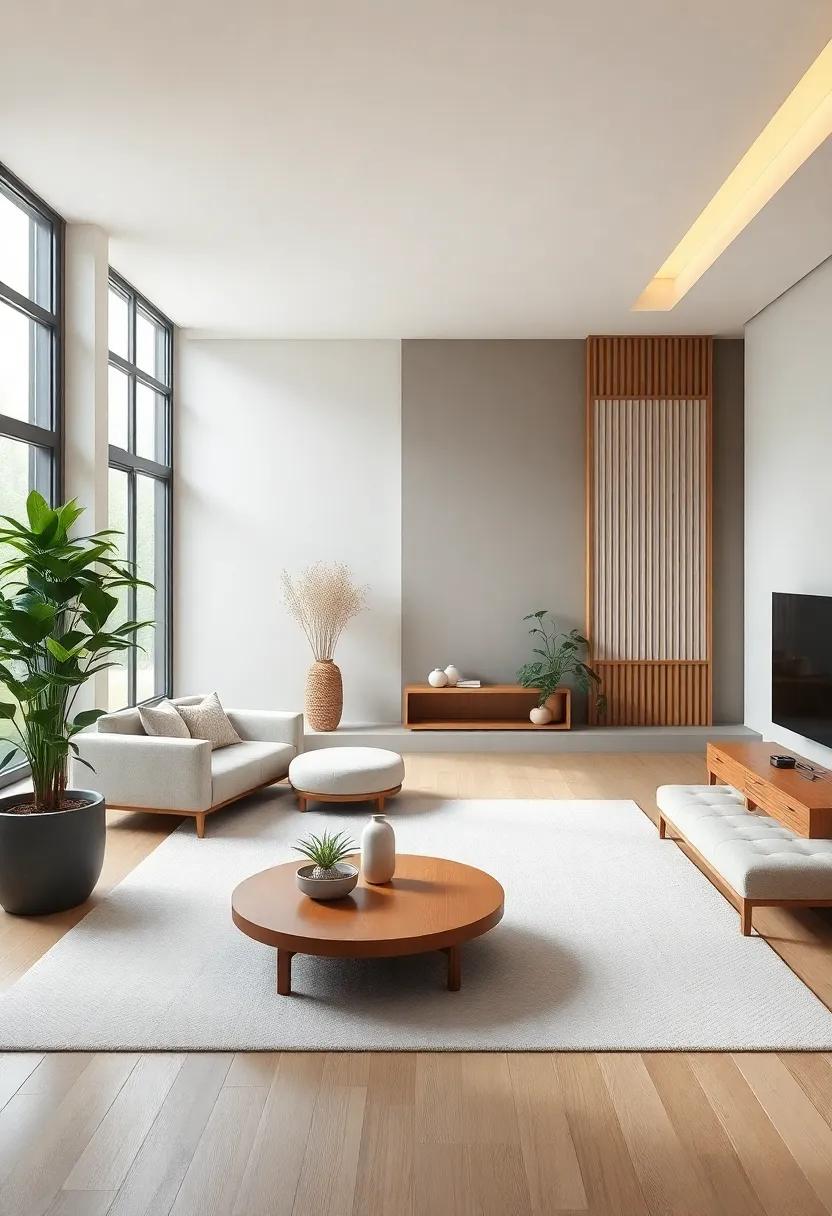
Creating a serene atmosphere in your living room begins with selecting the right color palette. Consider using hues that evoke tranquility and promote relaxation. Soft shades of blue, green, or muted earth tones can foster a sense of calm. these colors mimic nature and can make a space feel more spacious and inviting. When combined with minimalistic decor, they prevent visual clutter, allowing the mind to rest. Remember to include a balance of light and dark shades to create depth and interest without overwhelming the senses.
Incorporating accents can elevate your color scheme without compromising its serene essence. Focus on integrating subtle pops of color through your choice of accessories. Some ideas include:
- Throw pillows in soft lavender or pale peach
- Artwork featuring abstract designs in muted tones
- A soft, neutral rug to ground the space
To illustrate how different shades interact, consult the table below to visualize potential combinations that encourage an atmosphere of calm:
| Primary Color | Complementary Shades | Accent Colors |
|---|---|---|
| Soft Blue | Light Gray, Cream | Dusty Rose |
| Muted Green | Beige, Soft White | Warm Terracotta |
| Earthy Brown | Sand, Tan | Rust |
The Art of Kintsugi: Celebrating Imperfections in Decor
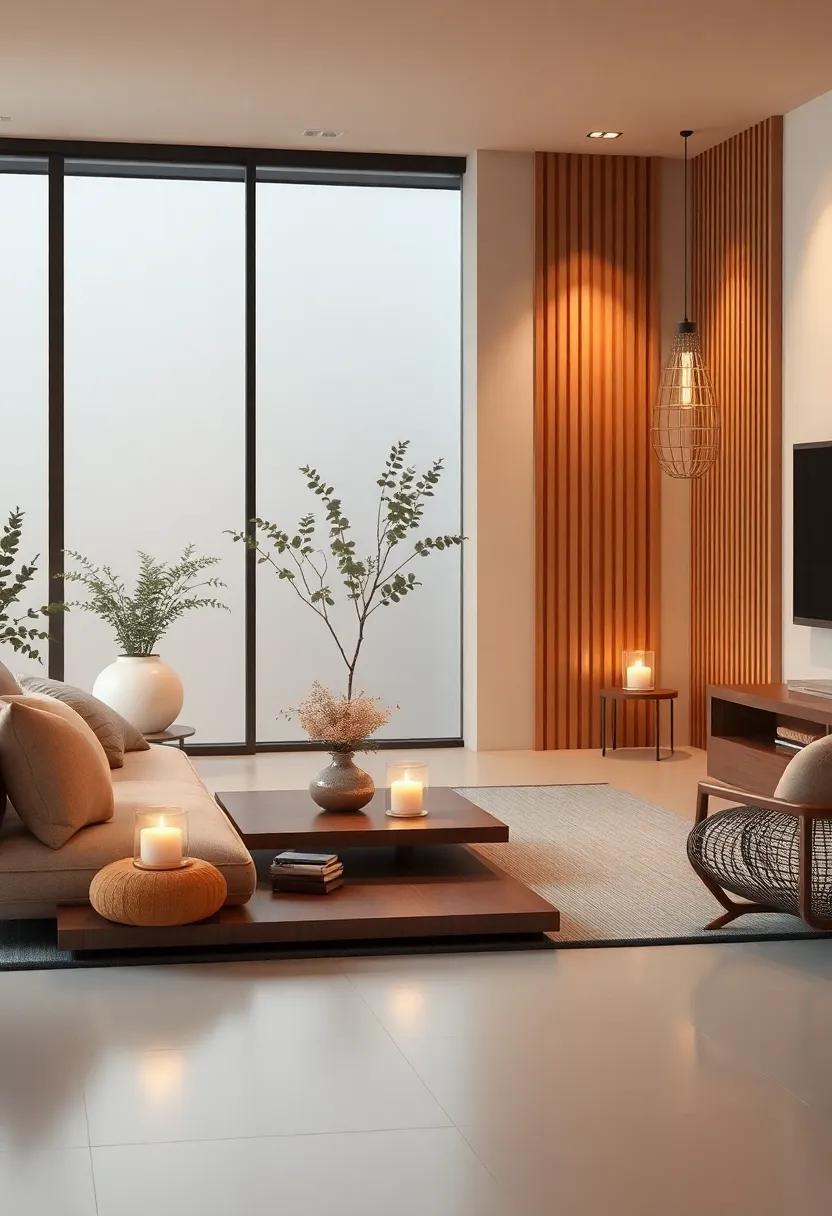
In the realm of Japanese decor, the philosophy of Kintsugi shines as a transformative approach to not just aesthetics but also to the concept of beauty itself. This ancient art, which involves repairing broken pottery with lacquer mixed with gold, teaches us to celebrate the imperfections that life presents. When incorporated into your living room, elements crafted in this manner can serve as focal points, inviting contemplation and conversation. Each piece tells a story, reflecting the passage of time and the beauty found in resilience.Consider incorporating the following elements to draw inspiration from Kintsugi:
- Textured Throw Pillows: Opt for pillows that feature subtle repairs or unique stitching, symbolizing life’s little scars.
- Artistic Pottery: Choose vases or bowls that embrace the Kintsugi aesthetic, showcasing art that thrives in its brokenness.
- Decorative Trays: Use trays with gold or metallic accents where the repairs are visible, adding a touch of elegance to your space.
Integrating Kintsugi-inspired decor into your living room not only provides visual interest but also fosters a serene habitat. Each piece acts as a reminder of the beauty inherent in imperfection, echoing the philosophy of wabi-sabi. To further enhance this atmosphere, consider incorporating a balance of organic materials and natural light. Here’s a simple guide:
| Material | Effect |
|---|---|
| Wood | Adds warmth and earthiness |
| Stone | Brings stability and a sense of permanence |
| Textiles | Softens the space and adds comfort |
Bringing Nature Indoors with zen Gardens and Indoor Plants
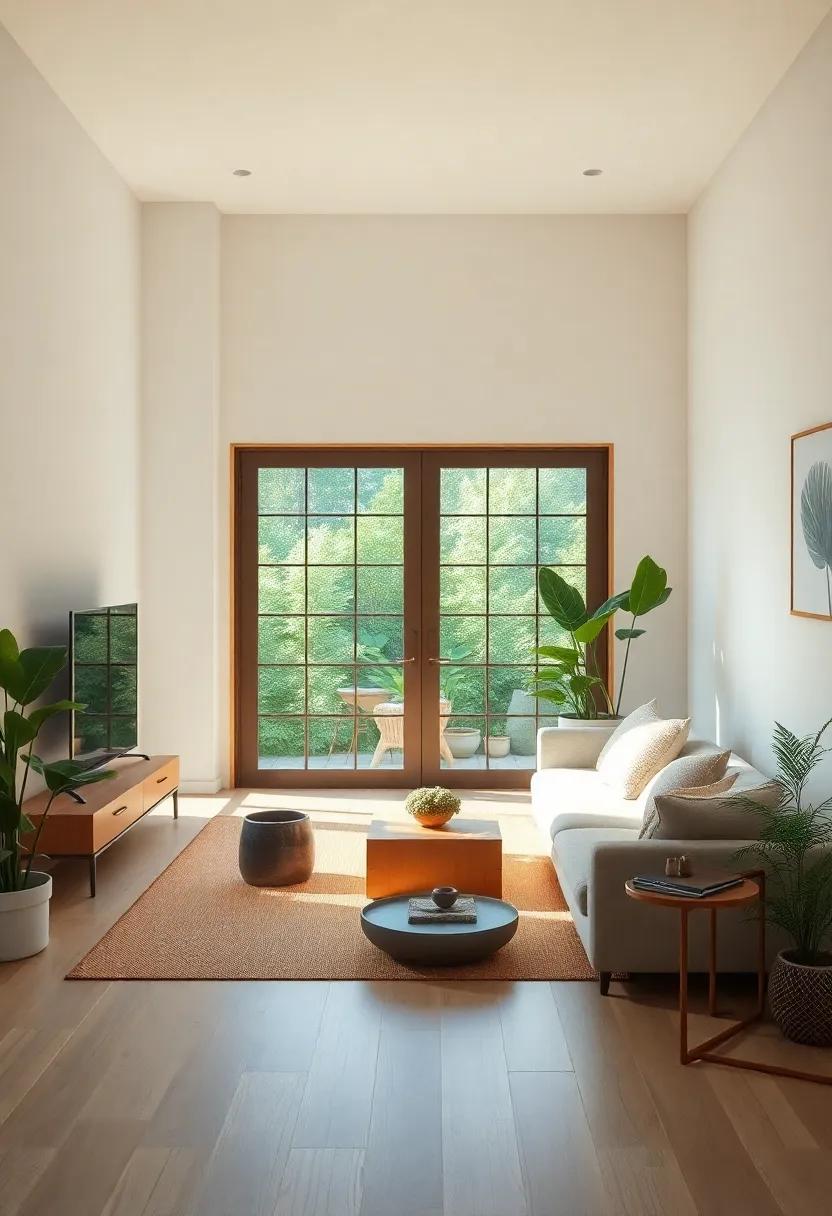
Incorporating a Zen garden into your living space transforms not just the aesthetics, but also the atmosphere of your home. These miniature landscapes often consist of carefully raked gravel, smooth stones, and a few carefully positioned plants, creating an epitome of tranquility. Here are some essential elements to consider for your Zen garden:
- Gravel: Use fine white sand or gravel to symbolize water, which can be raked into intriguing patterns.
- rocks: Select a few large stones to represent islands or mountains, adding depth and character.
- Plants: Incorporate small, hardy plants like moss or succulents to bring life and color.
- Miniature Statues: Consider adding a small Buddha or other figurines for a spiritual touch.
Introducing indoor plants into your Japanese decor complements the serene environment fostered by your zen garden. Plants not only purify the air but also create a harmonious balance within the space. Here’s a selection of plants that thrive indoors while enhancing Japanese aesthetics:
| Plant | Benefits |
|---|---|
| Bonsai | Symbolizes patience and harmony; adds artistry. |
| Peace lily | Improves air quality; signifies purity. |
| Snake Plant | easy to care for; promotes relaxation. |
| Ferns | Adds greenery; evokes tranquility. |
Fostering Calm with Soft Textures and Comfortable Furnishings
Creating a serene Japanese living room involves more than just selecting colors; it’s about the tactile experience of the space. Soft, natural textures play a vital role in fostering a calm environment. Consider incorporating materials like cotton, linen, and wool to envelop your space in warmth. Complement these textiles with furnishings that prioritize comfort, such as:
- Low-slung sofas that invite relaxation
- Plush floor cushions for informal seating
- Natural wood coffee tables that serve as focal points
To further enhance the tranquil vibe, layering is key.Use soft throw blankets in muted tones draped over armchairs or the back of your sofa. This not only adds warmth but also visual interest.A well-placed area rug made from natural fibers can ground the space and provide a cozy backdrop. Incorporating a few elements that promote simplicity—such as a low wooden bench or a minimalist side table—keeps the space open and airy, fostering an environment that invites calmness and peace.
Creating a Focal Point with Japanese-Inspired Artwork
Japanese-inspired artwork has a unique ability to draw the eye and stir the soul. When selecting pieces, consider nature themes that reflect the serene beauty of Japanese landscapes, such as cherry blossoms, mountains, and flowing rivers. The use of subtle color palettes helps to maintain a tranquil atmosphere, with soft pastel hues or delicate ink wash techniques enhancing the overall aesthetic. Additionally,incorporating traditional art forms such as Sumi-e (ink painting) or Ukiyo-e (woodblock prints) not only adds authenticity but also creates a soothing focal point that invites contemplation and calm.
To elevate this ambiance, you can emple various display techniques:
- frame artwork in minimalist frames that complement the natural wood tones of your furniture
- Cluster smaller pieces together, creating a gallery wall that tells a story
- Use a single large canvas to create a dramatic impact, commanding attention without overwhelming the space
| Artwork Type | Ideal Placement |
|---|---|
| Landscape Paintings | Above the sofa or fireplace |
| Wall Scrolls | In a corner or entryway |
| Woodblock Prints | On a side table or mantelpiece |
The Timeless Appeal of Low-Lying Furniture in Japanese Design
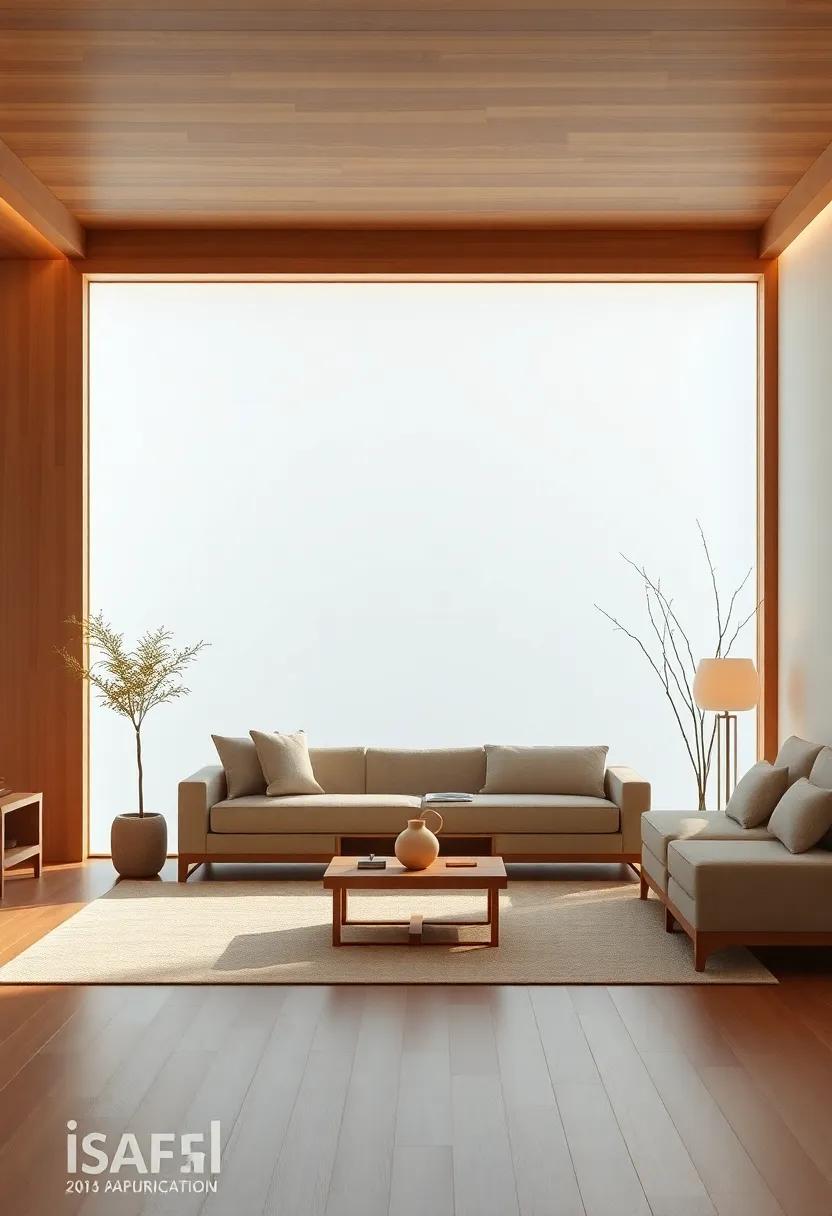
In Japanese design,low-lying furniture serves as a homage to simplicity and harmony,evoking a sense of tranquility that resonates through the space. This design choice encourages a closer connection to the earth,fostering a grounding atmosphere conducive to relaxation and mindfulness. Elements of low-lying furniture—such as tatami mats and low tables—create an inviting environment that promotes informal gatherings and deeper conversations. The understated elegance of these pieces complements natural materials, allowing the beauty of their simplicity to shine through without overwhelming the senses.
Moreover, the use of low furniture aligns seamlessly with the concept of ma, the Japanese principle of negative space. This principle emphasizes the importance of empty spaces that invite contemplation and tranquility. By integrating low-slung sofas, cushions, and tables into living areas, one can achieve a harmonious balance between functional living and peaceful aesthetics.When curated thoughtfully, a low-profile setting elegantly marries comfort with a distinctly serene ambiance, making every moment spent within the space a soothing oasis of calm.
Crafting Tranquil Seating areas with Floor Cushions and Mats
Creating a serene retreat within your living space is easily achievable with the thoughtful inclusion of floor cushions and mats. These versatile elements not only bring warmth and comfort but also encourage a relaxed ambiance ideal for quiet reflections or social gatherings. Opt for natural materials like cotton or linen infused with earthy hues to harmonize with the tranquility of a Japanese aesthetic. By arranging cushions of various sizes and textures in inviting clusters,you can establish a cozy nook for lounging or meditation,encouraging moments of serenity amidst your daily life.
When selecting mats, consider weaving intricate patterns that evoke traditional Japanese designs, which can serve as both a focal point and a tactile experience underfoot. Layering is key: placing softer cushions atop woven mats not only adds depth but also enhances comfort. Additionally, you might experiment with multi-functional pieces, such as those that fold or stack away conveniently, allowing you to adapt your space for varying activities. The gentle transition of colors and materials will help create visual harmony, inviting you to embrace the peaceful essence of your surroundings.
Blending Modern Accents with Classic Japanese Influences
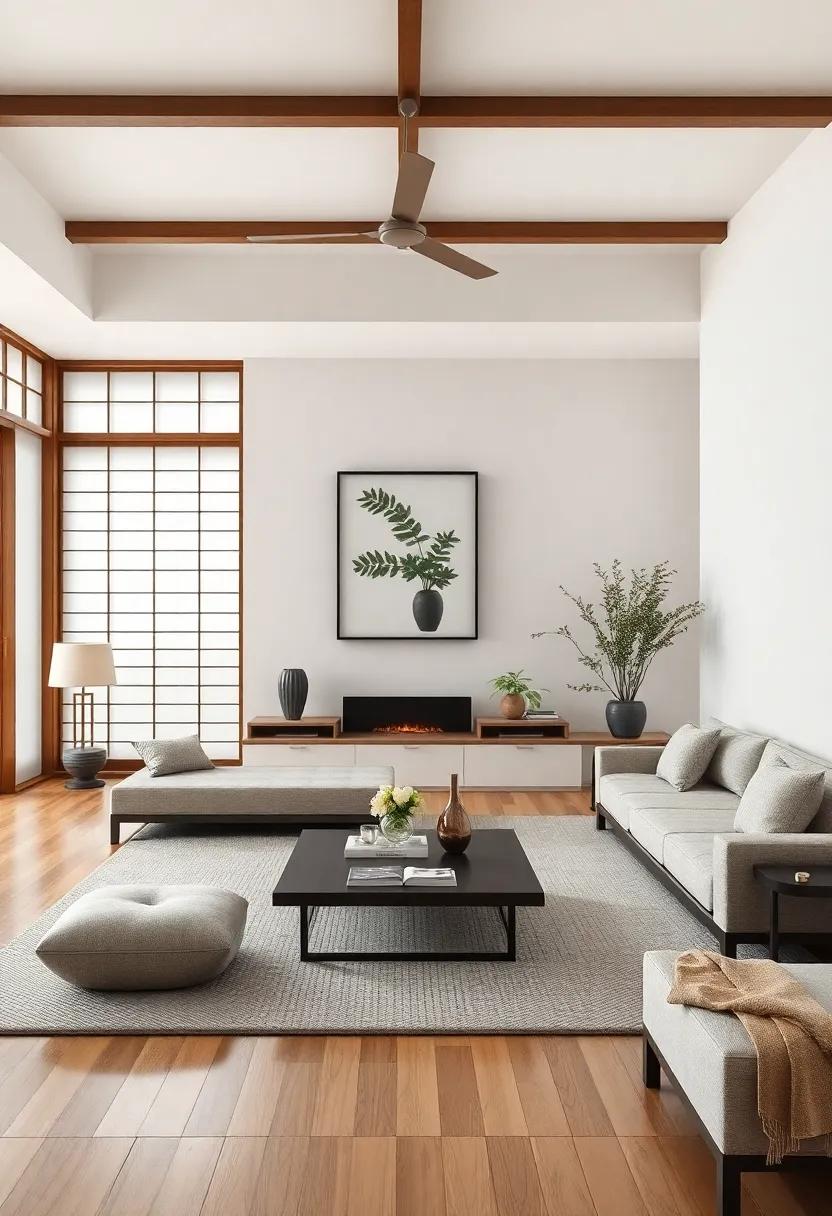
To create a harmonious living space that radiates tranquility, it’s essential to thoughtfully blend modern design elements with classic Japanese aesthetics. Natural materials play a pivotal role in this fusion, where sleek, contemporary pieces made from wood, metal, and glass can complement timeless Japanese elements like tatami mats and shoji screens. Incorporating a color palette that emphasizes neutral tones,soft whites,and earthy shades evokes a peaceful ambiance,inviting the essence of the outdoors inside. Consider using modern furniture featuring clean lines alongside traditional low-profile seating and decorative accents that reflect Japanese craftsmanship, enriching your space with a sense of history and elegance.
In addition to furniture selection, the art of arrangement is crucial in achieving a serene atmosphere. Emphasize balance by arranging pieces to allow for ample space to breathe, mirroring the Japanese concept of negative space, or ‘ma.’ Integrate bold, modern artwork or sculptures that resonate with the minimalist Japanese ethos, creating focal points that spark interest without overwhelming the senses. Accessories such as contemporary vases and handcrafted pottery can serve as conversation starters while staying true to the serene aesthetic. By harmoniously blending these distinctive styles, you cultivate an inviting living room that celebrates both modernity and tradition.
Utilizing Shoji Screens for Privacy and Elegant Separation
Incorporating shoji screens into your living space not only enhances the aesthetic appeal but also provides a refined solution for maintaining privacy. These traditional Japanese screens, made of a wooden frame and translucent paper, serve to delicately divide areas without compromising on light. By placing them strategically, you can create intimate nooks for relaxation or reading, effectively guiding the flow of energy throughout the room. Consider the following benefits of shoji screens:
- Subtle Privacy: Perfect for separating shared spaces without completely blocking visibility.
- Natural Light: Diffuse sunlight to create a warm and inviting atmosphere.
- Versatility: Easily movable to suit your changing needs and layouts.
When selecting shoji screens, look for designs that resonate with your overall decor theme, whether it be minimalistic or ornate. pair them with complementary furniture to achieve a harmonious balance. Here’s a simple comparison of common materials used in shoji screens:
| Material | Advantages | Considerations |
|---|---|---|
| Wood | durable and strong | Can be heavy, may require maintenance |
| Bamboo | Lightweight and eco-kind | Less sturdy, may warp over time |
| Metal | Modern look, very durable | Can feel cold and uninviting |
The Role of Feng Shui in Enhancing Harmony in Living Spaces
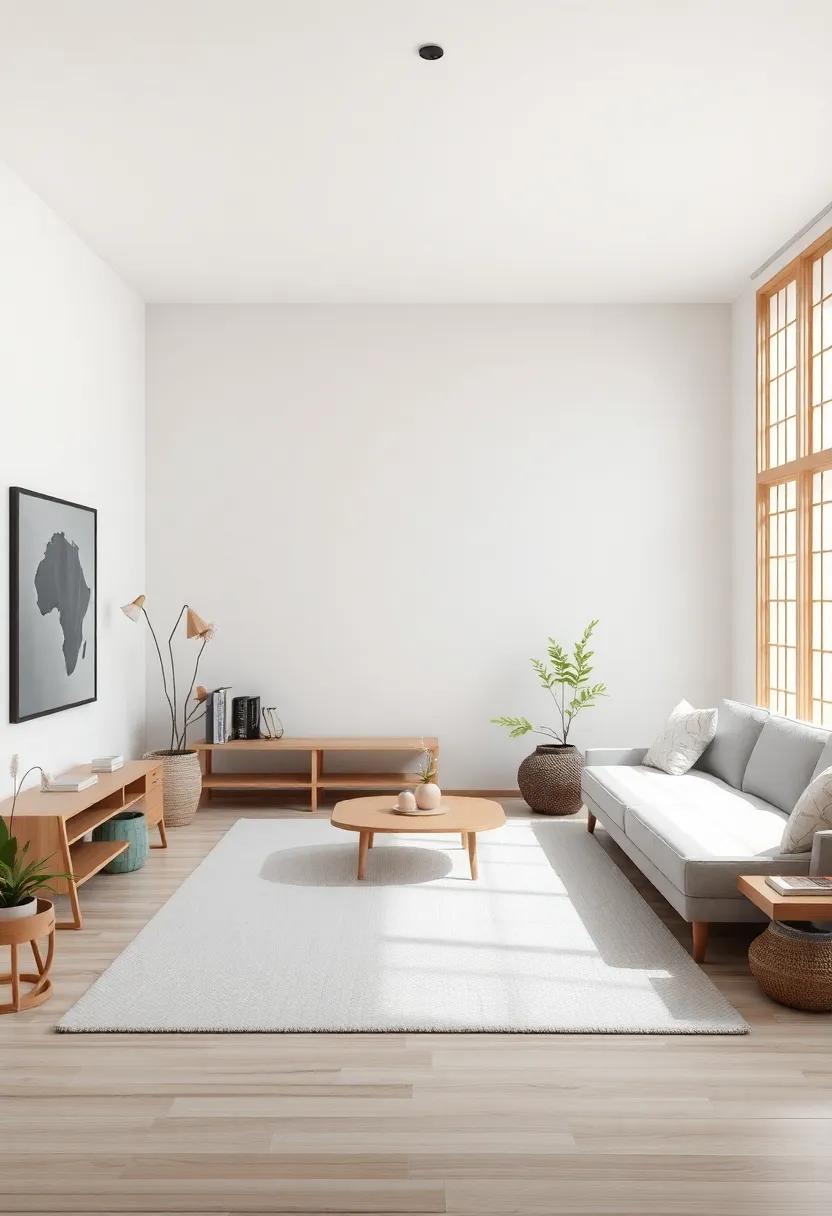
Feng Shui, the ancient Chinese practice of arranging spaces for optimal energy flow, can significantly enhance the serenity of your living environment. By thoughtfully considering the placement of furniture, colors, and decor elements, you can create a harmonious atmosphere that promotes relaxation and well-being. Key principles include:
- Natural Elements: Integrate wood, water, fire, earth, and metal to establish a balanced environment.
- Decluttering: Remove unnecessary items to allow for free movement and energy flow.
- Light and Air: maximize natural light and airflow to improve the overall vitality of the space.
The arrangement and aesthetics of your living room can also play a crucial role in setting the emotional tone of your home. Consider how the layout encourages interaction and ease; as an example, seating should facilitate conversation while minimizing barriers. In addition, colors impact mood, so aim for a palette that reflects tranquility—think soft neutrals, muted greens, and calming blues.To visualize the potential, here’s a simple table summarizing color effects:
| color | Effect |
|---|---|
| Soft Blue | Promotes calmness and tranquility |
| Warm Beige | Offers warmth and comfort |
| Gentle Green | Encourages balance and rejuvenation |
Incorporating Water Features for a Serene Soundscape
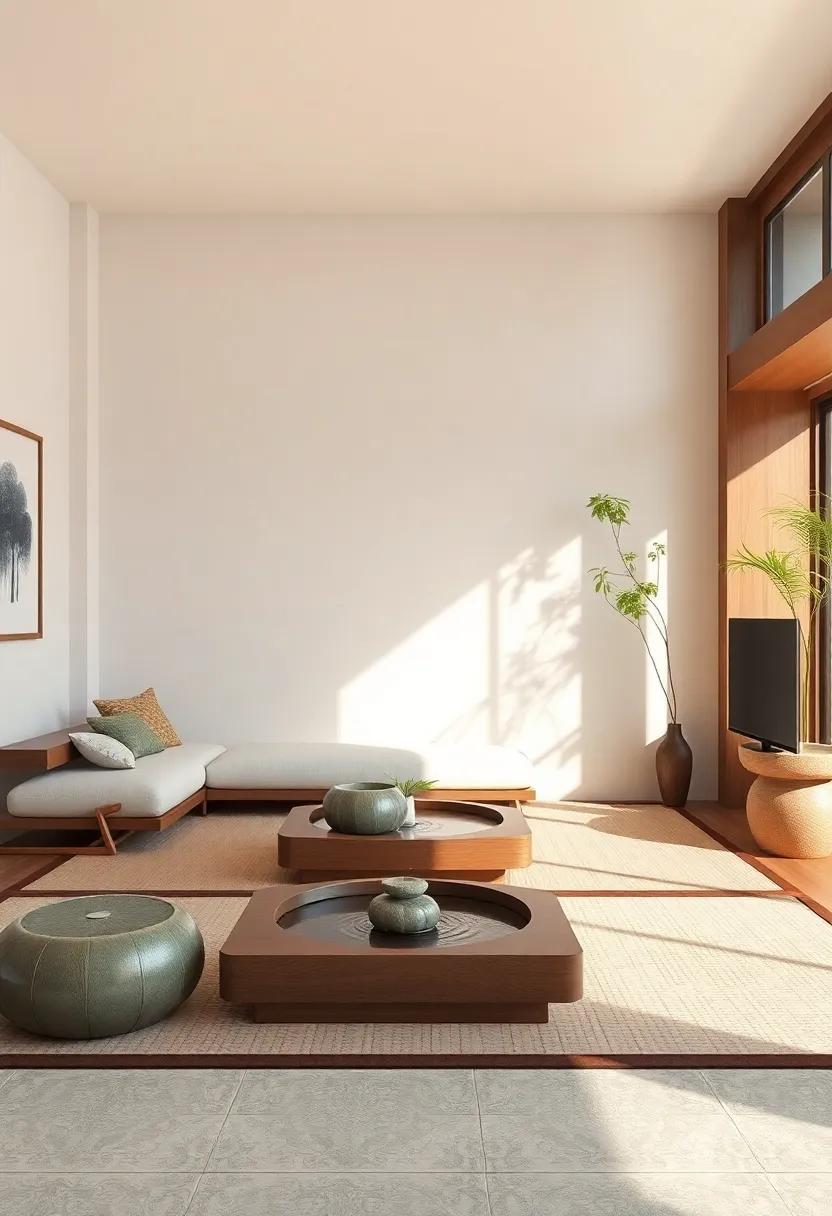
integrating water features into your space can transform its atmosphere into a tranquil oasis. The gentle trickle of water not only acts as a natural sound barrier, but also brings a sense of calm and serenity that promotes relaxation. Consider the following options for adding water features:
- Miniature Zen Fountains: These compact designs fit effortlessly into any corner of your living room, creating soft murmurs that soothe the mind.
- Indoor Water Walls: A larger commitment, water walls can serve as a stunning focal point, cascading water down intricate designs that echo the sound of nature.
- Tabletop Aquariums: Merging aquatic life with decor, these small installations create movement and sound, while serving as a captivating conversation starter.
When choosing a water feature, pay attention to the placement and design to ensure it harmonizes with the overall aesthetic of your room. Consider items that reflect minimalist japanese principles, such as:
| Design Element | functionality |
|---|---|
| Stone Basins | Complements natural elements and provides a rustic touch. |
| Bamboo Spouts | Offers a traditional aesthetic while enhancing the tranquil sound of flowing water. |
by carefully selecting a water feature that aligns with your vision of a serene space, you’ll forge a connection between the indoor environment and the calming essence of nature, enriching your Japanese-inspired living room.
The Importance of Mindful Clutter Management for Serenity
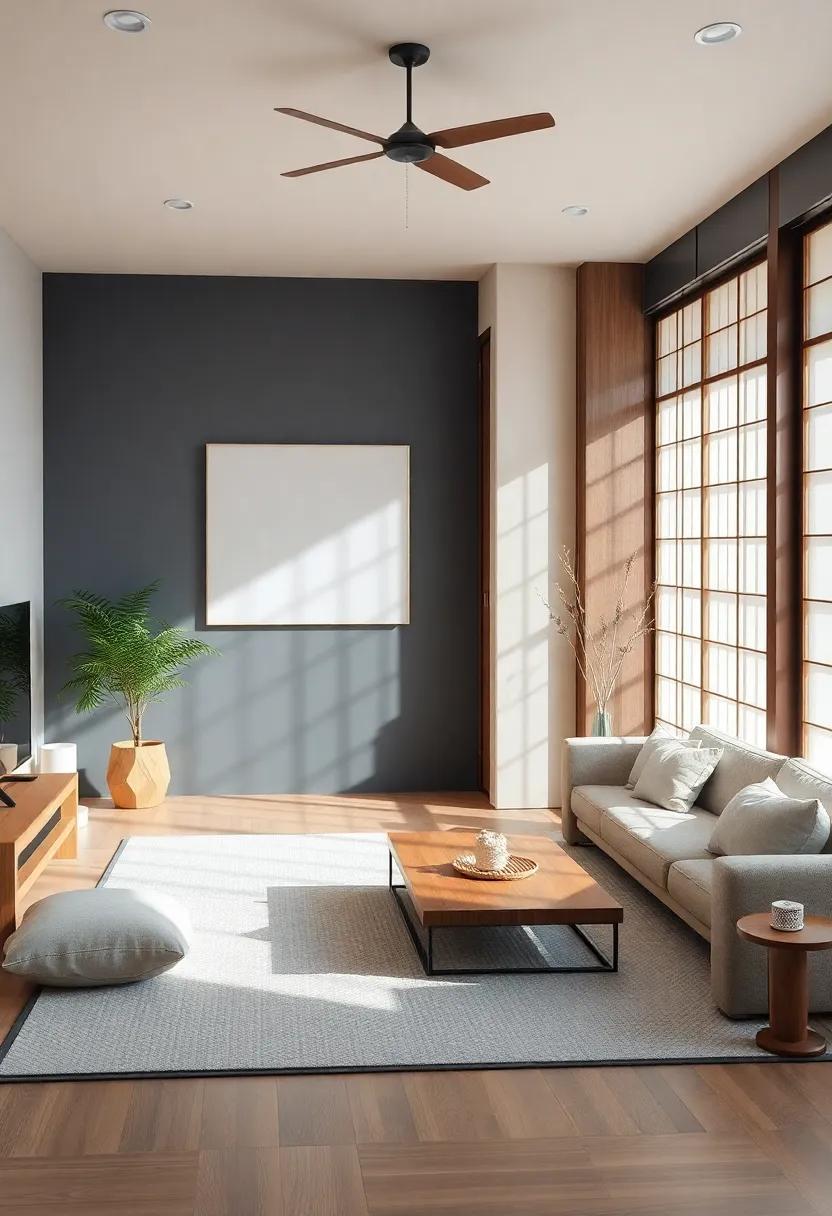
Managing clutter mindfully is essential for cultivating a serene atmosphere in your living space. A cluttered environment can lead to visual overwhelm and mental distractions, which ultimately detract from the tranquility you seek. To achieve a peaceful sanctuary, consider embracing a minimalist approach that aligns with the Japanese aesthetic of simplicity and nature. Focus on keeping only those items that bring you joy or serve a practical purpose, allowing your space to breathe and your mind to unwind.
Here are some effective strategies for mindful clutter management:
- Regular Decluttering: Set aside time each week to evaluate your belongings.
- Intentional Decor: Choose decor items that resonate with your personal style while keeping the space open and airy.
- Natural Elements: Incorporate plants to add life without adding clutter.
- Functional Furniture: Opt for multi-functional pieces to reduce excess items.
| Strategy | Benefit |
|---|---|
| Regular Decluttering | Maintains a balanced space |
| Intentional Decor | Enhances focus on beauty |
| natural Elements | Improves air quality |
| Functional Furniture | Reduces visual stress |
Curating Meaningful decor Pieces that Inspire Peace
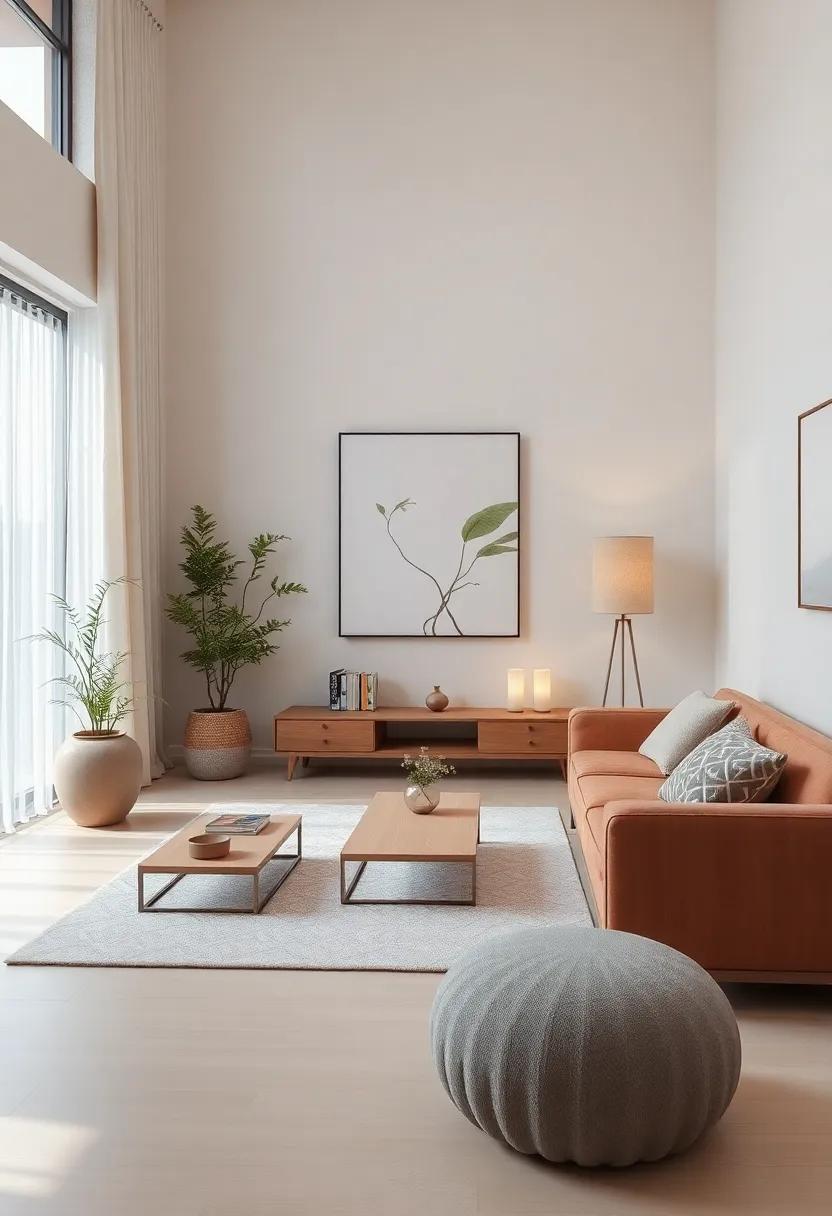
In the quest for tranquility, each decor piece in your Japanese-inspired living room should tell a story of harmony and simplicity. Choose natural materials that reflect the beauty of nature, such as wood, stone, and bamboo. Incorporate elements like tatami mats and futons, which not only provide functional comfort but also connect your space to traditional Japanese aesthetics. To evoke a sense of serenity, consider adding carefully curated art pieces—perhaps a Japanese ink painting or a subtle calligraphy scroll—that capture the essence of nature or philosophical concepts. These artworks can create focal points that draw the eye and heart, inviting a moment of reflection.
Lighting plays an essential role in cultivating a peaceful atmosphere. Opt for soft, warm lights, such as paper lanterns or shoji screens that diffuse sunlight gracefully throughout the day. Additionally,incorporating indoor plants can bring life into your decor while purifying the air; consider varieties like bamboo or peace lilies that embody tranquility. To seamlessly blend your items, use a harmonious color palette characterized by soft earth tones and gentle neutrals, enhancing the calming vibe of your space. Creating a tableau that promotes peace requires intentional choices, where each piece contributes to a serene and cohesive environment.
Creating Ambiance with Soft Lighting and Candles
To cultivate a serene atmosphere in your Japanese living room,the use of soft lighting and candles serves as an integral part of the decor. Seek out warm-toned light fixtures that mimic the gentle glow of the sun. Paper lanterns or adjustable dimmable lights can effectively create layers of light, enhancing the tranquil vibe. Incorporating table lamps with fabric shades and low-wattage bulbs can also contribute to the soft, inviting ambiance. Experiment with different lighting angles and placements to find the perfect balance that envelops your space in comfort.
Candles add a touch of warmth and intimacy, doubling as decor and a calming presence. Consider using decorative candle holders made from natural materials like wood or stone to align with the Japanese aesthetic. Opt for unscented candles in varying heights and sizes, artfully arranged on trays or within stunning bowls. To further enhance the experience, explore the traditional art of kintsugi, the Japanese practice of repairing pottery with lacquer dusted or mixed with powdered gold, which beautifully incorporates a sense of delicate beauty into your candle displays. A cohesive setup can be created by incorporating these elements:
| Lighting Source | Type | Placement Suggestions |
|---|---|---|
| Paper Lanterns | Soft Glow | Corner of the room |
| Dimming Floor Lamp | Adjustable | Near seating area |
| Decorative Candles | Varied Heights | on a low wooden table |
Exploring Natural Materials for a Warm and Inviting Feel
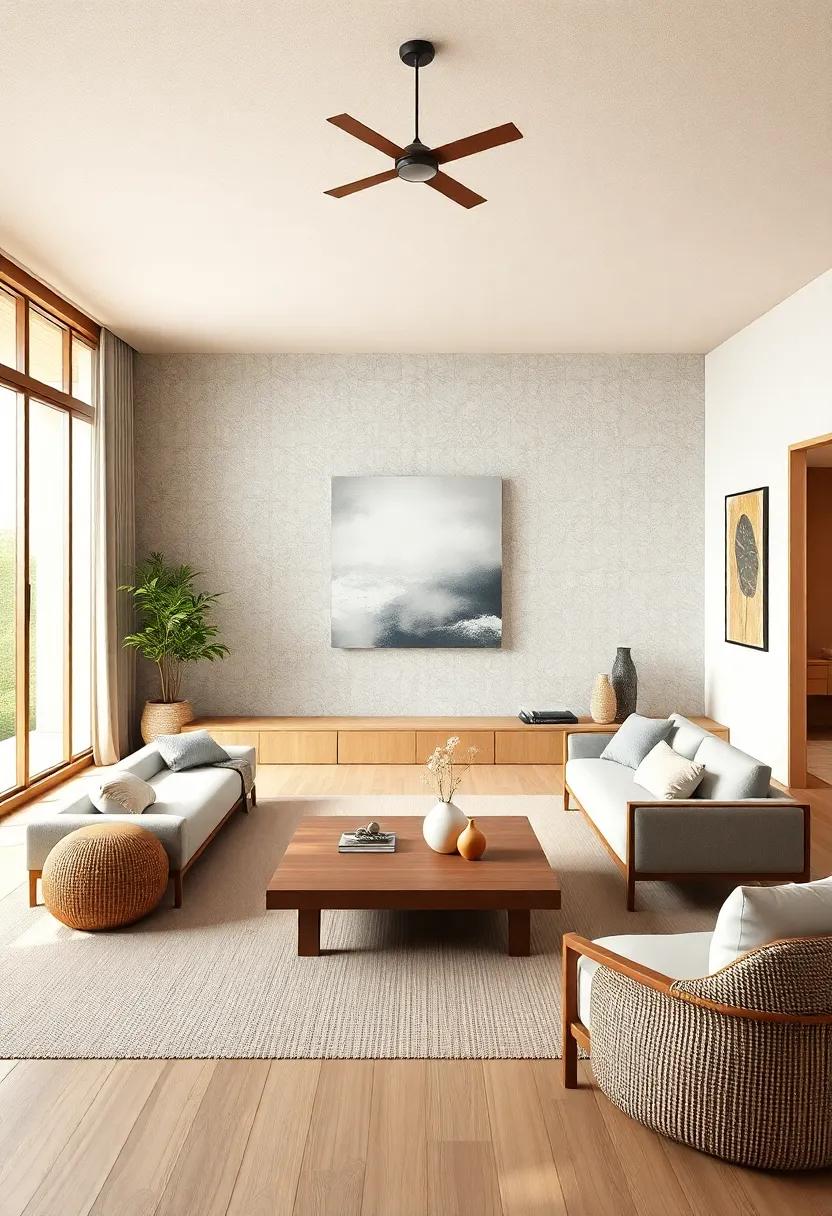
incorporating natural materials into your living space enhances the warmth and tranquility characteristic of Japanese design. The gentle touch and unique textures found in materials like wood,stone,and bamboo cultivate an atmosphere that’s both soothing and inviting. Consider using warm wooden furniture, such as a low-profile table or tatami mats, to ground the room in earthiness. Pair these elements with natural textiles—soft cotton,linen,or silk cushions that echo the soothing color palette of nature,bringing an elegant balance to the décor.
Furthermore, integrating stone accents and indoor plants provides depth and a touch of the outdoors, elevating the serene ambiance. A simple stone lantern or a small rock garden can serve as a focal point, drawing the eye while fostering a sense of peace. When selecting decor, aim for muted, natural tones that harmonize with the overall design. Here’s a speedy reference table for materials that resonate with Japanese aesthetics:
| material | Effect |
|---|---|
| Wood | Brings warmth and earthiness |
| Bamboo | Adds a sense of calm and elegance |
| Stone | Offers a grounding, natural aesthetic |
| Cotton/Linen | Provides softness and comfort |
| Silk | Conveys luxury and tranquility |
Integrating Calligraphy and Sumi-e Art for cultural Depth
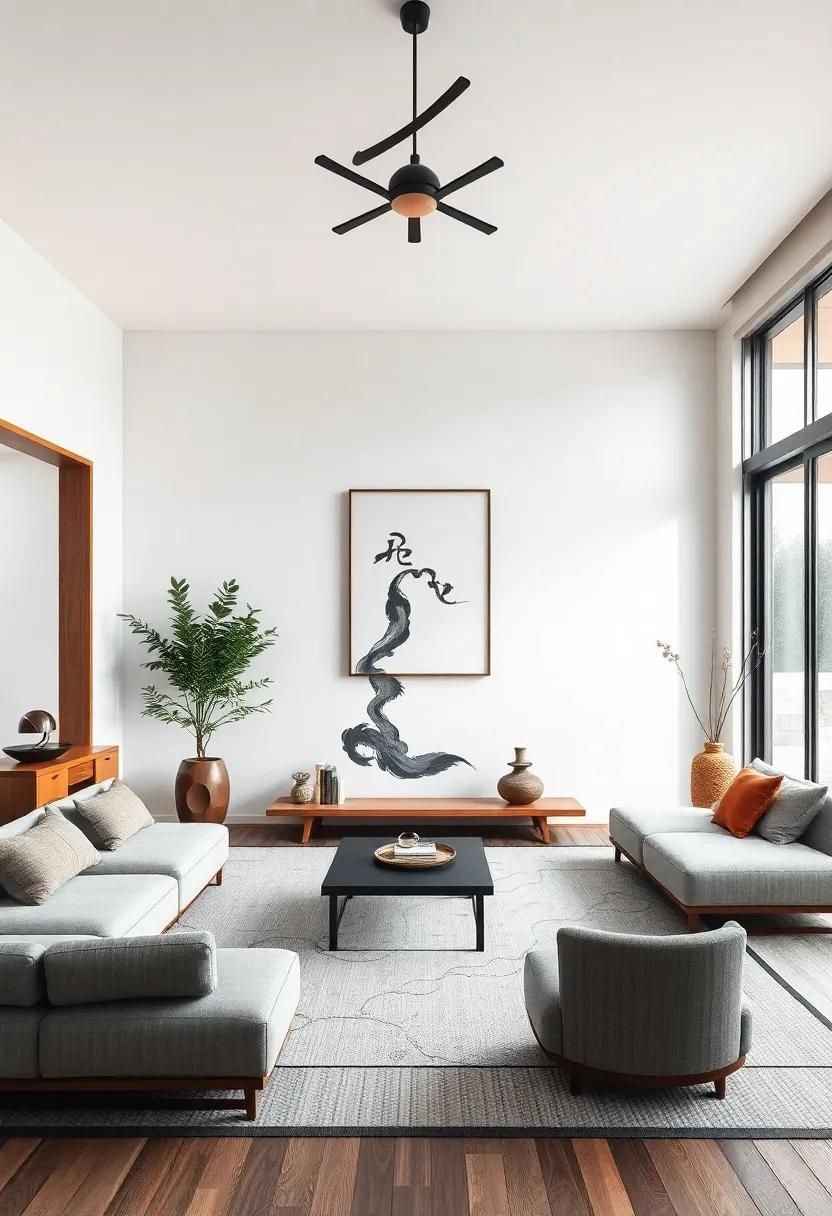
Integrating calligraphy and Sumi-e art in your decor not only enhances the aesthetic appeal but also weaves a rich cultural narrative into your living space. The graceful strokes of calligraphy, frequently enough depicting beautiful kanji characters, can evoke feelings of peace and contemplation, while the delicate brushwork of sumi-e captures the essence of nature’s tranquility.Consider choosing elements such as:
- Framed Calligraphy Scrolls: Hang pieces that resonate with personal meaning or reflect philosophical messages.
- Sumi-e Paintings: select serene landscapes or tranquil scenes that invite calm and meditative thoughts.
- mixed Media Artwork: Combine both disciplines on a canvas to create a harmonious blend of text and imagery.
The beauty of these art forms lies in their simplicity and depth. When displayed together, calligraphy and Sumi-e can create a dialog that speaks to the heart of Japanese aesthetics, embracing the concept of ‘wabi-sabi’—the beauty found in imperfection. For a cohesive look, use a color palette that reflects these traditions, such as:
| Color | Symbolism |
|---|---|
| Black | Elegance and Depth |
| White | Purity and Simplicity |
| earthy Tones | Connection to Nature |
By thoughtfully integrating these two art forms into your living room, you can establish a serene environment that not only reflects a sense of tranquility but also honors the rich cultural heritage they represent. The balance between calligraphic elegance and the fluidity of Sumi-e art can transform your space into a haven of peace and introspection.
Celebrating Seasons with Thoughtful decor Transitions
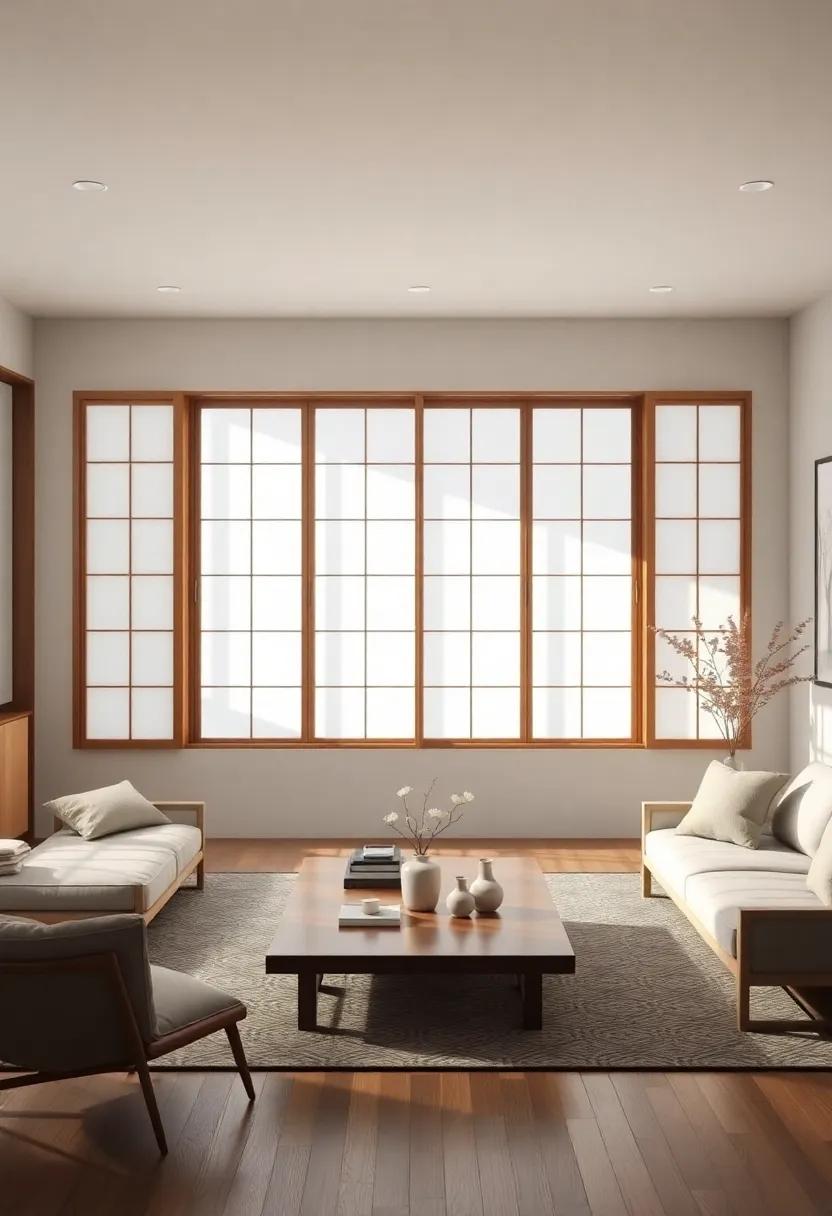
As the seasons shift, so does the possibility to refresh your living space and embrace the tranquil essence of Japanese decor. Begin by transitioning your decor elements to reflect nature’s changes. Incorporate subtle hues and natural materials that resonate with the current season. For spring, consider delicate cherry blossom branches in a simple vase, while summer may call for vibrant green foliage or bamboo accents. In autumn, you might opt for warm tones through soft textiles and rustic wooden elements, and in winter, embrace minimalism with white tones and cozy textiles to create a serene atmosphere.
| Season | Decor Ideas |
|---|---|
| Spring | Cherry blossoms, pastel cushions, light curtains |
| Summer | Bamboo accents, light wood furniture, airy textiles |
| Autumn | Earthy tones, knitted throws, warm lighting |
| Winter | White accents, minimal decor, cozy rugs |
Don’t overlook the power of lighting and aroma in your space. Warm,soft lighting can mimic natural daylight during shorter months,fostering a sense of comfort and openness. Using essential oil diffusers or scented candles infused with traditional Japanese scents like cherry blossom or sandalwood can further invite a calming aura. Arrange the lighting fixtures and diffusers thoughtfully in spaces where relaxation and peace are paramount, allowing them to harmonize with your transition to a more serene seasonal decor.
As we draw to a close on our exploration of tranquil Japanese living room decor, let us carry forward the essence of serenity that these spaces embody. The art of Japanese design is not just about aesthetics; it serves as an invitation to embrace simplicity and mindfulness in our daily lives. By incorporating elements such as natural materials, harmonious colors, and unobtrusive furnishings, we invite a sense of calm that can transform our living environments into sanctuaries of peace.
in a world often filled with chaos, taking time to create a tranquil atmosphere is not merely a choice but a necessity for nurtured well-being. May the principles we’ve discussed inspire you to curate your own serene oasis—a space where you can retreat, reflect, and rejuvenate. As you embark on this journey of mindful decor, remember that each carefully chosen detail contributes to a larger narrative of tranquility.
So, gather your inspiration, let your creativity flow, and step into the comforting embrace of Japanese aesthetic simplicity.Here’s to creating spaces that resonate with peace—a testament to the beauty of serene living.


